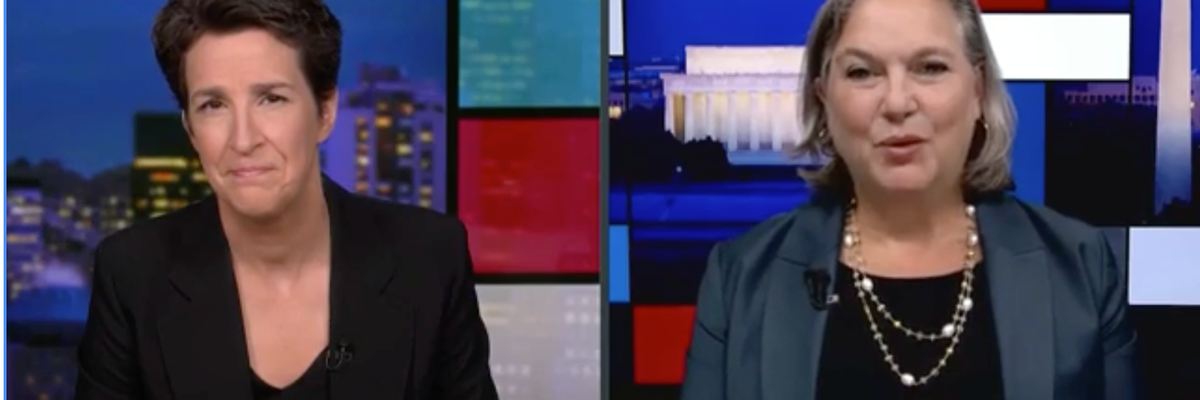Victoria Nuland, whose infamous words “f-ck the EU” epitomized American primacy as it worked to mold the Ukrainian government after the 2014 revolution and helped to set up the country for a brutal showdown with Russia’s Vladimir Putin, now says that Russia is trying to elect Donald Trump, again.
"He's at it again!" Nuland told Rachel Maddow, the MSNBC host whose red string conspiracy board was a regular feature for years during Trump’s tenure and Russiagate, until she wasn’t. Now she is back, and hosting the old gang.
“It’s good to be back with you Rachel to talk to you about this as we did in 2016 as well as 2020,” said Nuland, without a trace of irony. She retired this year from the State Department.
"And (Putin) has more sophisticated tools... He's got a brand new, very powerful tool, which is Elon Musk and X. In 2020, the social media companies worked hard with the U.S. government to try to do content moderation, to try to catch this stuff as it was happening. This time, we have Elon Musk talking directly to the Kremlin and ensuring that every time the Russians put out something, it gets five million views before anyone can catch it."
Nuland was talking about a report in the New York Times on Tuesday that said that Russia, China, and Iran were all meddling in the presidential election. It said their tactics have “matured into a consistent and pernicious threat, as the countries test, iterate and deploy increasingly nuanced tactics, according to U.S. intelligence and defense officials, tech companies and academic researchers. The ability to sway even a small pocket of Americans could have outsize consequences for the presidential election, which polls generally consider a neck-and-neck race.”
Nuland was right that the government warned about the same thing in 2020, and that social media companies “worked” with the government to address what they said was pernicious meddling. But she fails to mention (not surprisingly) that beginning in 2017 government agencies including the FBI, DHS, intel community, and yes, State Department, put these companies under tremendous pressure to “acknowledge” the meddling in 2016, forcing untold posts and accounts to be deleted and millions of dollars spent fo “due diligence” in monitoring posts and activity through the 2020 election. This was all in the Twitter files. It has been acknowledged as much by Mark Zuckerbeg, CEO of Facebook (now Meta), who reaffirmed the pressure not once but twice (the second time was more about COVID) since the last election.
Nevertheless, a NYU study last year said that the meddling likely had little impact on votes in 2016.
But let’s talk about the meddling that did have an impact. Like U.S. government-led democracy promotion, and quasi-government efforts, including the National Endowment for Democracy (for which Nuland is a newly minted board member), helping to foment the anti-Russian Orange revolution, then Maidan revolution that overturned the elected government in Ukraine in 2014. Nuland was on the ground there and can be seen in photographs handing out sandwiches to demonstrators. As President Viktor Yanukovych was being tossed out, Nuland was recorded in a conversation with U.S. Ambassador to Ukraine, Geoffrey Pyatt, plotting who was in or out of the mix as a new Ukraine government was being assembled. This is where she made her infamous “you know, f-ck the EU” comment.
When Russia invaded Crimea and then Ukraine in 2022, rather than see this as dangerous escalation, if not blowback to the aggressive “democracy promotion” policies in the former Soviet sphere that she had supported, first during the Obama Administration, then under Biden, it was an affirmation. She has said only when Putin is gone will Ukraine be safe (a sentiment shared by Biden at the beginning of the war).
No doubt she feels the same way about Trump, telling Maddow, "Trump is taking Putin lessons, as autocrats around the world are." But meanwhile, hundreds of thousands of Ukrainians are dead or wounded, the population has shrunk 25% and the war is not only far from over, Ukraine is by all metrics, losing. How many Ukrainians must fight for the crusades of ideologues thousands of miles away? Ask Maddow and Nuland.
They are stuck in the narratives of 2016 and 2020 because an election is just days away, and as I wrote back January, their Russian “malign influence” story “helped to get the public’s buy-in for a new Cold War with Russia by normalizing the idea that Russians not only helped to elect Donald Trump, but were actively trying “‘to destroy U.S. democracy.’”
We will have to decide whether it is in Americans’ best interest to indulge this again, given all that has happened in the last four years.
- Nuland fuels theory that Western powers killed 2022 peace deal ›
- Victoria Nuland never shook the mantle of ideological meddler ›
















